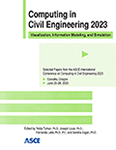Risk-Reward Allocation among Integrated Project Delivery Method Stakeholders: A Gamified Cooperative Data Simulation Approach
Publication: Computing in Civil Engineering 2023
ABSTRACT
Integrated project delivery (IPD) method is associated with numerous benefits, including enhanced project performance, collaboration, and information sharing among project stakeholders. However, the lack of adequate incentive and reward mechanisms is still considered as the main reason for slowing down the adoption of IPD. As such, the goal of this paper is to identify a fair and efficient risk pool distribution among IPD project stakeholders. The adopted methodology included (1) assigning the risks associated with each stakeholder, (2) computing valuations for all possible subset coalitions among IPD project stakeholders that reflect their risk control capabilities as well as their coordination effects, and (3) utilizing cooperative game theory to generate fair and efficient distribution mechanisms given different a priori working and coalitional preferences. As such, a total of 22 risks were identified and quantified to calculate the risk control valuations of all subset coalitions using Monte-Carlo simulations. Afterward, these valuations were utilized to generate fair risk and reward distributions using the Shapley value and Owen value for games with a priori unions. The coalitional stability of the generated results was evaluated using propensity-to-disrupt ratios. Ultimately, the findings of this paper indicate that an IPD-multiparty agreement where all parties are engaged early on in establishing the contract results in the most balanced willingness to cooperate among stakeholders. Finally, the outcome of this paper equips industry practitioners with a distribution mechanism that corresponds to the adopted IPD relational configuration on one hand and the overall IPD project stability on the other.
Get full access to this article
View all available purchase options and get full access to this chapter.
REFERENCES
Ahmed, M. O., Abdul Nabi, M., El-adaway, I. H., Caranci, D., Eberle, J., Hawkins, Z., and Sparrow, R. 2021. Contractual guidelines for promoting integrated project delivery. J. Constr. Eng. Manag.147(11), 05021008.
Anderson, S., and Tucker, R. 1990. Potential for construction industry improvement: volume I assessment methodology. Austin, TX: CII.
Assaad, R., El-Adaway, I. H., and Abotaleb, I. S. 2020. Predicting project performance in the construction industry. J. Constr. Eng. Manag., 146(5).
Caulier, J., Skoda, A., and Tanimura, E. 2017. Allocation Rules for Networks Inspired by Cooperative Game-Theory. Revue d'économie politique, 127, 517–558.
CII (Construction Industry Institute). 2013. IR181-2 - Integrated Project Risk Assessment (IPRA), Version 2.0. Austin, TX: Construction Industry Institute.
Eissa, R., Eid, M. S., and Elbeltagi, E. 2020. A cooperative game theoretic model for revenue sharing in construction joint ventures. In Construction Research Congress 2020 (pp. 1149–1157). Reston, VA: American Society of Civil Engineers.
Eissa, R., Shahin, Y., and Eid, M. S. Sharing Risk Contingency Costs in Construction Joint Venture Agreements: A Cooperative Game Theory Approach. In Construction Research Congress 2022 (pp. 20–29).
Gately, D. 1974. Sharing the Gains from Regional Cooperation: A Game Theoretic Application to Planning Investment in Electric Power. International Economic Review 15 (1).
Ghassemi, R., and Becerik-Gerber, B. 2011. Transitioning to integrated project delivery: potential barriers and lessons learned. Lean Construction Journal. 2011:32–52.
Kent, D. C., and Becerik-Gerber, B. 2010. Understanding construction industry experience and attitudes toward integrated project delivery. J. Constr. Eng. Manag. 136(8):815–825.
Littlechild, S. C., and Vaidya, K. G. 1976. The propensity to disrupt and disruption nucleolus of a characteristic function game. International Journal of Game Theory 5 (2): 151–161.
Lowe, R. H., and Muncey, J. M. 2009. ConsensusDOCS 301 BIM addendum. Construction Law. 29(17).
Matthews, O., and Howell, G. A. 2005. Integrated project delivery: an example of relational contracting. Lean Construction Journal. 2(1):46–61.
Owen, G. 1977. Values of games with a priori unions. In: Henn R, Moeschlin O (eds) Essays in mathematical economics and game theory. Springer, Berlin, pp 76–88.
Owen, G. 2013. Game theory. Emerald Group Publishing.
Rahman, M. M., and Kumaraswamy, M. M. 2004. Contracting relationship trends and transitions. J. Manag. Eng. 20(4):147–161.
Shapley, L. S. 1953. A value for n-person games. In Contributions to the Theory of Games. Vol II.
Smith, R. E., Mossman, A., and Emmitt, S. 2011. Lean and IPD special issue. Lean Construction Journal.
Teng, Y., Li, X., Wu, P., and Wang, X. 2019. Using cooperative game theory to determine profit distribution in IPD projects. Int. J. Constr. Manag. 19(1), 32–45.
Information & Authors
Information
Published In
History
Published online: Jan 25, 2024
ASCE Technical Topics:
- Business management
- Computer vision and image processing
- Computing in civil engineering
- Construction engineering
- Construction management
- Contracts and subcontracts
- Decision making
- Engineering fundamentals
- Game theory
- Industries
- Methodology (by type)
- Monte Carlo method
- Numerical methods
- Organizations
- Practice and Profession
- Project delivery
- Project management
Authors
Metrics & Citations
Metrics
Citations
Download citation
If you have the appropriate software installed, you can download article citation data to the citation manager of your choice. Simply select your manager software from the list below and click Download.
